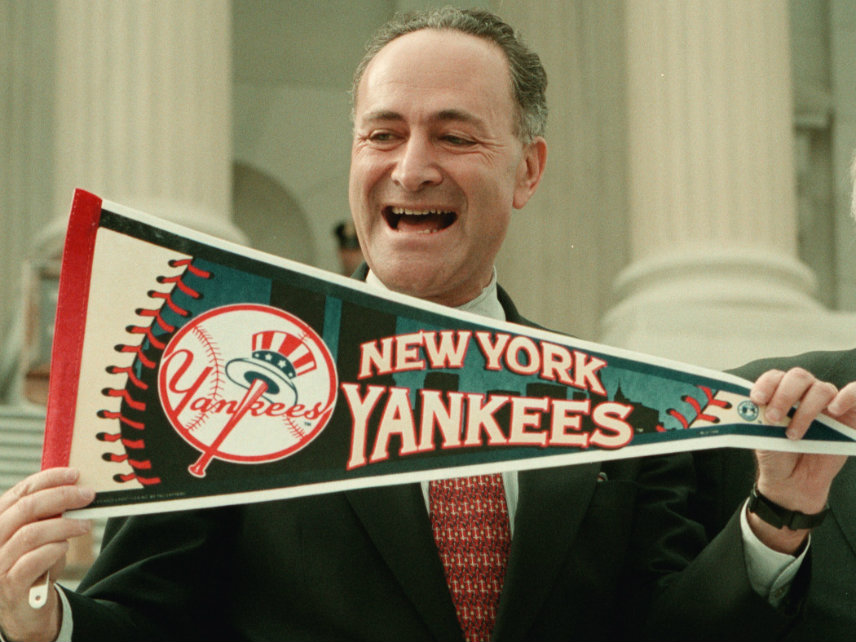Sports Betting Just Became Legal. Naturally, Chuck Schumer Now Wants to Regulate It.
Like powdered chocolate, laser pointers, and video games, legal sports betting has caught the attention of the Senate's most notorious nanny.

Since the U.S. Supreme Court struck down near-prohibition on sports betting, there has not been any compelling evidence that letting Americans bet on sports poses any risk to the integrity of athletic competitions or to the people placing wagers on them.
That lack of evidence is apparently not going to stop Senate Democratic Leader Chuck Schumer (D-N.Y.) from trying to bring sports betting back under the federal government's yoke. Citing vague concerns about "integrity," Schumer on Wednesday outlined a proposal that would regulate sports betting at the federal level, taking key policy decisions out of state lawmakers' hands and delivering what could be a huge windfall for the top sports leagues.
According to ESPN's Darren Rovell, who first reported it, Schumer's bill would require sportsbooks to share reports of suspicious activities with state and federal regulators, and would give leagues the ability to determine which bets would be allowed. His plan would also require that sportsbooks only use offical league data—such as final scores and player statistics—which they would have to purchase from the leagues, probably for a hefty sum.
Perhaps the oddest detail in Schumer's plan is prohibiting anyone under the age of 21 from betting on sports—odd, because 18 year-olds are allowed to play everything from state lotteries to the various games of skill and luck offered by casinos. It's also unclear how allowing 19 year-olds to bet on basketball games, for example, would undermine the sport's integrity.
Since the Supreme Court in May struck down a 1992 federal law banning sports betting in most states, Delaware, New Jersey, and Mississippi have already joined Nevada as the only states with legalized sports betting. Several other states are in the process of legalizing sports betting. If passed, Schumer's bill would require states to follow the federal legal framework—essentially leaving states with only the choice of whether to offer legal sports betting or not.
Getting a high-ranking senator like Schumer to back this proposal is a huge win for sports leagues, most of which favor a federal legal framework. The gaming industry would prefer to have states set their own rules for how sports betting will operate.
"Federal oversight of sports betting was an abject failure for 26 years only contributing to a thriving illegal market with no consumer protections and safeguards," the American Gaming Association, a trade group, said in a statement about Schumer's bill. "New federal mandates are a nonstarter."
The gaming industry probably isn't interested in federalism for philosophical reasons. There's a more practical consideration here: casinos and other locations offering gambling have existing relationships with state policymakers and are better able to control the process at that level.
Motivations aside, it's probably right to let states experiment with different legal frameworks for sports betting to see what does and doesn't work. The last time the federal government made a sweeping decree about sports betting, it only pushed demand for sportsbooks underground. The AGA estimates that the illegal market for sports betting in America is about $150 billion annually. Legalization should bring some or all of that business into the light, which is good for the integrity of the game, for bettors, and for states that figure to reap large tax windfalls from sports betting that's on the up-and-up.
Schumer has a long and inglorious history of trying to protect Americans from nonexistent threats—he's tried to ban everything from laser pointers to detergent pods, from fast food bread to video games, and from chocolate powder to homemade bombs. (Pretty sure that last one is already illegal, Chuck.)
Absent any actual evidence that betting on games is threatening the integrity of Schumer's precious New York Yankees—or, for that matter, evidence that federal regulations will reduce the risk of legal sports better affecting the integrity of games—this seems like another idea of Schumer's that shouldn't be taken seriously.


Show Comments (17)